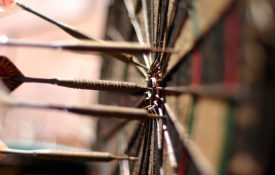-

New Research From Clinical Psychological Science
A sample of research exploring criterion thresholds, nonsuicidal self-injury, the network stability of anxiety and depression, replicability of PTSD networks, and interpretation biases in depression and social anxiety.
-

Watching Others Makes People Overconfident in their Own Abilities
Watching YouTube videos, Instagram demos, and Facebook tutorials may make us feel as though we’re acquiring all sorts of new skills but it probably won’t make us experts.
-
This Is Why Some People Are Braver Than Others, According to Science
Following the shooting at Marjory Stoneman Douglas High School in Parkland, FL, which killed 17 people, survivors shared the stories of students and teachers who bravely sacrificed their own lives to save others. Many spoke of the bravery of Aaron Feis, a football coach at the high school, who reportedly put himself between students and the shooter to prevent more deaths. But while coverage of the Parkland shooting has been dominated by acts of heroism, another narrative has also emerged. Last week, for instance, Broward County Sheriff Scott Israel reported that high school security officer Scot Peterson never went inside the high school or tried to confront the gunman during the attack.
-
One Of Déjà Vu’s Most Striking Features Is Just An Illusion
Actually, you don't -- you just think you do. A pair of researchers form Colorado State Researchers dug into the feeling of premonition that often accompanies déjà vu, using lab experiments that tried to induce the sensation and tracked whether subjects really did know what would come next. As it turns out, déjà vu didn't seem to bestow the ability to predict the future. "The results suggest that feelings of premonition during déjà vu occur and can be illusory," writes the study's first author, Anne Cleary, in the study published in the journal Psychological Science. Scientists are still trying to wrap their heads around déjà vu.
-
Plus un pays est développé, moins les femmes font d’études scientifiques (The more a country is developed, the less women do scientific studies)
Aux États-Unis, 8 % seulement des diplômés de sciences informatiques sont des femmes. À l’inverse en Algérie, un pays où 15 % des femmes travaillent, elles représentent 41 % des diplômés dans le domaine des sciences, technologies, ingénierie et mathématiques (STEM). Ces données sont devenues une véritable tendance de fond: d’après la revue Psychological science, dans un article relayé par Slate, les pays les plus mal classés en termes d’égalité hommes-femmes sont ceux où ces dernières sont le plus nombreuses à s’engager dans des études scientifiques.
-
Are Babies Able to See What Others Feel?
When adults look out at other people, we have what psychologists and philosophers call a “theory of mind”—that is, we think that the people around us have feelings, emotions and beliefs just as we do. And we somehow manage to read complex mental states in their sounds and movements. But what do babies see when they look out at other people? They know so much less than we do. It’s not hard to imagine that, as we coo and mug for them, they only see strange bags of skin stuffed into clothes, with two restless dots at the top and a hole underneath that opens and closes. Our sophisticated grown-up understanding of other people develops through a long process of learning and experience.

